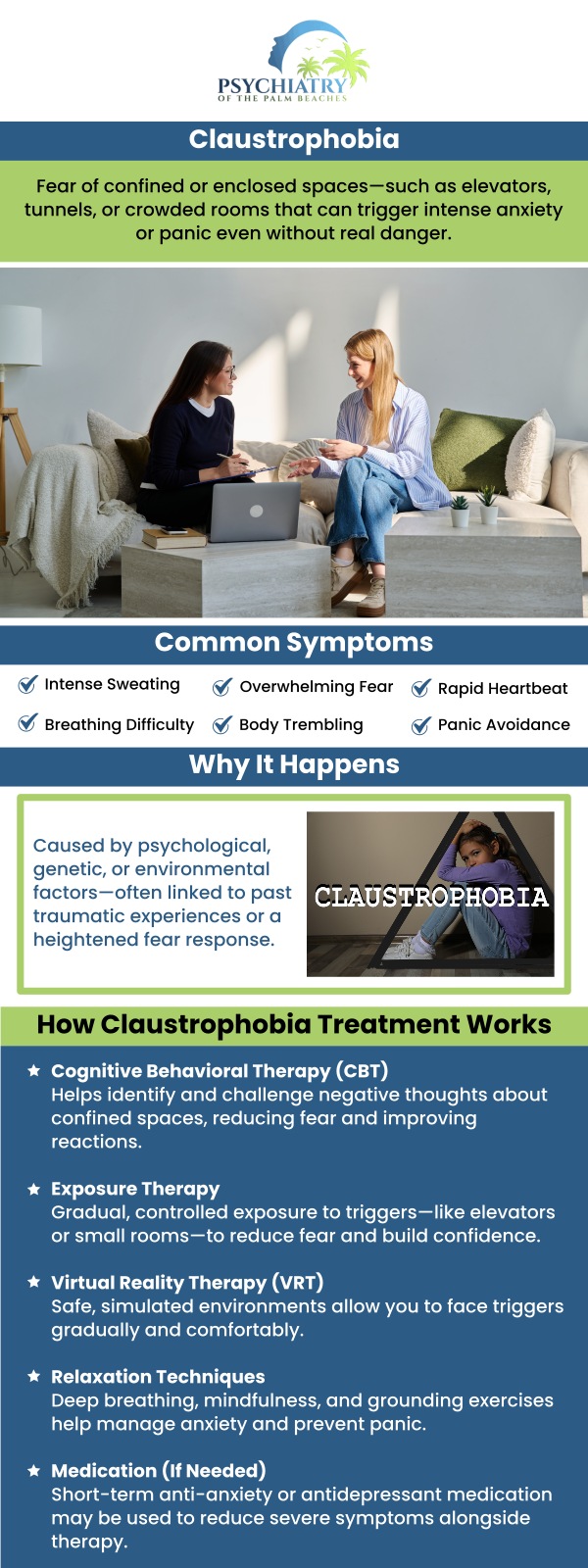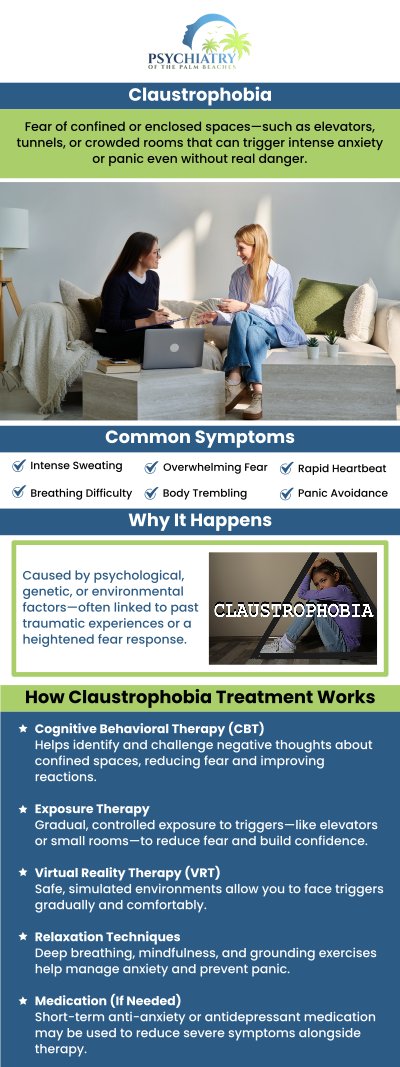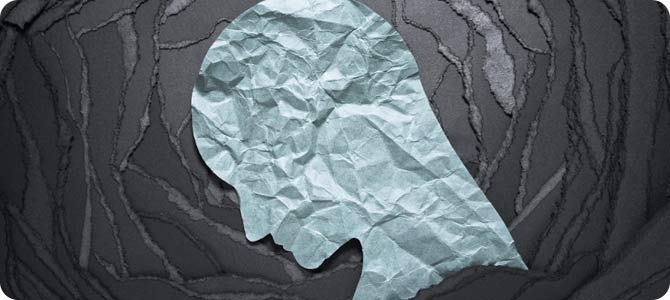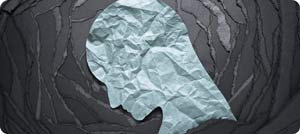Claustrophobia Disorder Treatment Q&A
Claustrophobia is an irrational fear of confined areas. Individuals who have claustrophobia frequently make an extra effort to stay away from cramped areas like elevators, tunnels, subway trains, and public restrooms. Yet, staying away from these locations could make the phobia worse. Our dedicated team is committed to providing personalized and compassionate care aimed at addressing the specific needs of each individual. For more information, contact us today or book an appointment online. Visit Psychiatry of the Palm Beaches serving Jacksonville, Boynton Beach, Palm Beach Gardens, Stuart, Royal Palm Beach, Port St. Lucie, Melbourne, Fort Lauderdale, and Jupiter, FL.




Table of Contents:
What is Claustrophobia?
What are the symptoms of claustrophobia?
How does claustrophobia start?
What is the first line of treatment for claustrophobia?
At Psychiatry of the Palm Beaches, we understand the deep-seated fear and discomfort associated with claustrophobia. Through a blend of cutting-edge treatment options and a holistic approach to mental health, we strive to empower our patients to overcome the limitations imposed by claustrophobia, paving the way for a life filled with freedom and tranquility.
Claustrophobia is defined as an anxiety disorder characterized by an irrational fear of confined spaces. Individuals with claustrophobia often experience intense fear or panic attacks when in elevators, small rooms without windows, crowded areas, or other enclosed environments. This fear can be so overpowering that it compels them to avoid situations where escape might be difficult or help wouldn’t be readily available, significantly impacting their daily life and activities. The symptoms of claustrophobia can vary widely among individuals, ranging from mild anxiety to severe panic and fear. Understanding and recognizing these signs is the first step toward seeking effective treatment and managing the condition.
The symptoms of claustrophobia are often immediate and distressing, manifesting both physically and emotionally. Physically, individuals may experience sweating, trembling, heart palpitations, or even a full-blown panic attack when faced with confined spaces or the prospect of being trapped. These reactions may be accompanied by difficulty breathing, dizziness, nausea, or a feeling of choking. On the emotional front, there’s an overwhelming fear of losing control, an urge to escape, and a sense of imminent danger or death, even in the absence of any real threat. These symptoms not only occur in the confined space itself but can also arise from mere anticipation of being in such a situation, affecting an individual’s ability to partake in everyday activities and reducing their quality of life.
Claustrophobia, like many anxiety disorders, often originates from a complex blend of genetic, psychological, and environmental factors. In some individuals, a traumatic event involving confined spaces—such as being trapped in an elevator or a small room—can trigger the onset of claustrophobia. For others, the condition might develop without a clear, singular event, emerging instead from a series of less noticeable experiences that gradually heighten sensitivity to confined spaces. Genetic predisposition also plays a role, with research suggesting that individuals with family members suffering from anxiety disorders are more likely to experience claustrophobia themselves.
Additionally, the way a person’s brain perceives and processes threats can contribute to the development of claustrophobia, with the amygdala—a part of the brain involved in processing fear—being overly responsive in those with this condition. Understanding the multifaceted origins of claustrophobia is crucial in tailoring effective treatment approaches for those affected.
The first line of treatment for claustrophobia typically involves cognitive behavioral therapy (CBT), a type of psychotherapy that is highly effective in treating anxiety disorders. CBT works by helping individuals identify and challenge irrational thoughts and fears associated with confined spaces, gradually reducing their anxiety. Through controlled exposure, patients are slowly introduced to the situations that trigger their claustrophobia in a safe and supportive environment, enabling them to build resilience against their fears. This method not only helps in understanding and changing negative thought patterns but also in learning coping mechanisms and relaxation techniques such as deep breathing and mindfulness.
Additionally, in some cases, medication may be prescribed alongside CBT to alleviate severe symptoms, though this tends to be more of a supplementary strategy rather than a primary treatment approach.
Our Team’s Expert Strategies for Understanding Claustrophobia Triggers
Claustrophobia often begins with specific triggers—tight spaces, closed rooms, MRI machines, elevators, or even crowded areas. Our team helps patients identify these triggers and understand the emotional and physical reactions that accompany them.
At Psychiatry of the Palm Beaches, we are here to support you on your journey towards managing and overcoming claustrophobia. Our expert team is dedicated to providing you with the care and tools necessary for you to live a life unhindered by fear and anxiety. If you or someone you know is struggling with claustrophobia, we encourage you to reach out. Together, we can explore the best treatment options tailored to your needs. For more information, contact us today or book an appointment online. We have convenient locations to serve you. We serve patients from Boynton Beach FL, Delray Beach FL, Palm Beach Gardens FL, Jupiter FL, Stuart FL, Palm City FL, Royal Palm Beach FL, Wellington FL, Citrus Ridge FL, Jacksonville FL, Riverside FL, Port St. Lucie FL, Beau Rivage West FL, Melbourne FL, Palm Bay FL, Fort Lauderdale FL, Hollywood FL, Jupiter FL, North Palm Beach FL, and surrounding areas.
Check Out Our 5 Star Reviews



Additional Services You May Need
▸ Mental Wellness
▸ Relationship Coaching
▸ Depression and Mood Disorders
▸ Women’s Health
▸ Panic Disorder
▸ Medications Management
▸ Men’s Health
▸ Individual Psychotherapy
▸ Bipolar
▸ ADHD
▸ Geriatric Mental Health
▸ Couple’s Counseling
▸ Obsessive Compulsive Disorder
▸ Social Phobia Treatment
▸ Eating Disorders
▸ Post Traumatic Stress Disorder
▸ Psychotic Disorders


